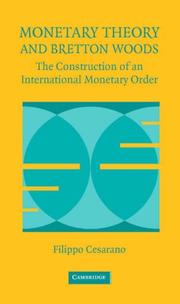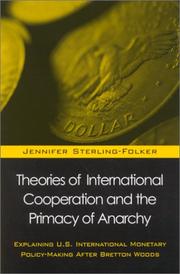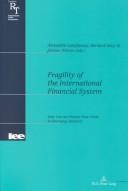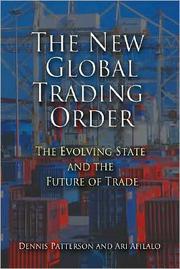| Listing 1 - 6 of 6 |
Sort by
|
Book
ISBN: 9780801452758 0801452759 1322523371 0801470617 9780801470615 9781501704376 9781322523378 Year: 2014 Publisher: Ithaca Cornell University Press
Abstract | Keywords | Export | Availability | Bookmark
 Loading...
Loading...Choose an application
- Reference Manager
- EndNote
- RefWorks (Direct export to RefWorks)
Eric Helleiner's new book provides a powerful corrective to conventional accounts of the negotiations at Bretton Woods, New Hampshire, in 1944. These negotiations resulted in the creation of the International Monetary Fund and the World Bank-the key international financial institutions of the postwar global economic order. Critics of Bretton Woods have argued that its architects devoted little attention to international development issues or the concerns of poorer countries. On the basis of extensive historical research and access to new archival sources, Helleiner challenges these assumptions, providing a major reinterpretation that will interest all those concerned with the politics and history of the global economy, North-South relations, and international development.The Bretton Woods architects-who included many officials and analysts from poorer regions of the world-discussed innovative proposals that anticipated more contemporary debates about how to reconcile the existing liberal global economic order with the development aspirations of emerging powers such as India, China, and Brazil. Alongside the much-studied Anglo-American relationship was an overlooked but pioneering North-South dialogue. Helleiner's unconventional history brings to light not only these forgotten foundations of the Bretton Woods system but also their subsequent neglect after World War II.
International finance --- Economic development --- Development, Economic --- Economic growth --- Growth, Economic --- Economic policy --- Economics --- Statics and dynamics (Social sciences) --- Development economics --- Resource curse --- History --- United Nations Monetary and Financial Conference --- Bretton Woods Conference --- Conférence monétaire et financière des Nations Unies, --- Conferencia Monetaria Internacional de Bretton-Woods --- Conferencia Monetaria y Financiera de las Naciones Unidos --- Monetary and Financial Conference, United Nations --- Rengōkoku Tsūka Kinʼyū Kaigi --- United Nations Monetary & Financial Conference --- United nations monetary and financial conference, --- United Nations Monetary and Financial Conference. --- E-books --- Internationale financiën
Book
ISBN: 0691149097 0691162379 1400846579 1299051308 1400898951 9781400846573 9781299051300 9780691149097 9781400898954 Year: 2013 Publisher: Princeton
Abstract | Keywords | Export | Availability | Bookmark
 Loading...
Loading...Choose an application
- Reference Manager
- EndNote
- RefWorks (Direct export to RefWorks)
When turmoil strikes world monetary and financial markets, leaders invariably call for 'a new Bretton Woods' to prevent catastrophic economic disorder and defuse political conflict. The name of the remote New Hampshire town where representatives of forty-four nations gathered in July 1944, in the midst of the century's second great war, has become shorthand for enlightened globalization. The actual story surrounding the historic Bretton Woods accords, however, is full of startling drama, intrigue, and rivalry, which are vividly brought to life in Benn Steil's epic account. Upending the conventional wisdom that Bretton Woods was the product of an amiable Anglo-American collaboration, Steil shows that it was in reality part of a much more ambitious geopolitical agenda hatched within President Franklin D. Roosevelt's Treasury and aimed at eliminating Britain as an economic and political rival. At the heart of the drama were the antipodal characters of John Maynard Keynes, the renowned and revolutionary British economist, and Harry Dexter White, the dogged, self-made American technocrat. Bringing to bear new and striking archival evidence, Steil offers the most compelling portrait yet of the complex and controversial figure of White--the architect of the dollar's privileged place in the Bretton Woods monetary system, who also, very privately, admired Soviet economic planning and engaged in clandestine communications with Soviet intelligence officials and agents over many years. A remarkably deft work of storytelling that reveals how the blueprint for the postwar economic order was actually drawn, The Battle of Bretton Woods is destined to become a classic of economic and political history.
International finance - History - 20th century. --- Keynes, John Maynard. --- Monetary policy - History - 20th century. --- White, Harry Dexter. --- Monetary policy --- International finance --- Finance --- Business & Economics --- Money --- 20th century --- History --- Keynes, John Maynard, --- White, Harry Dexter, --- United Nations Monetary and Financial Conference --- Monetary management --- Keĭns, Dzhon Maĭnard, --- Kʻai-yin-ssŭ, --- Kʻai-en-ssu, --- Keynes, J. M. --- Kenis, C. M., --- Keyns, C. M., --- Bretton Woods Conference --- Conférence monétaire et financière des Nations Unies, --- Conferencia Monetaria Internacional de Bretton-Woods --- Conferencia Monetaria y Financiera de las Naciones Unidos --- Monetary and Financial Conference, United Nations --- Rengōkoku Tsūka Kinʼyū Kaigi --- United Nations Monetary & Financial Conference --- United nations monetary and financial conference, --- Economic policy --- Currency boards --- Money supply --- 20th century. --- United Nations Monetary and Financial Conference. --- E-books --- -International finance --- -339.53 --- International monetary system --- International money --- International economic relations --- -History --- -Keynes, John Maynard --- Keynes, J. Maynard --- Keynes, J.M.

ISBN: 1107170788 1280703806 0511246498 0511247184 0511245025 0511309392 0511618093 0511245793 9780511247187 9780511245022 9780511245794 9780521867597 0521867592 0521867592 9780521867597 0521739098 Year: 2006 Publisher: Cambridge : Cambridge University Press,
Abstract | Keywords | Export | Availability | Bookmark
 Loading...
Loading...Choose an application
- Reference Manager
- EndNote
- RefWorks (Direct export to RefWorks)
Over the twentieth century monetary theory played a crucial role in the evolution of the international monetary system. The severe shocks and monetary gyrations of the interwar years interacted with theoretical developments that superseded the rigid rules of commodity standards and led to the full-fledged conception of monetary policy. The definitive demise of the gold standard then paved the way for monetary reconstruction. Monetary theory was a decisive factor in the design of the reform proposals, in the Bretton Woods negotiations, and in forging the new monetary order. The Bretton Woods system - successful but nevertheless short-lived - suffered from latent inconsistencies, both analytical and institutional, which fatally undermined the foundations of the postwar monetary architecture and brought about the epochal transition from commodity money to fiat money.
International finance --- Monetary policy --- History. --- United Nations Monetary and Financial Conference --- Bretton Woods Conference --- Conférence monétaire et financière des Nations Unies, --- Conferencia Monetaria Internacional de Bretton-Woods --- Conferencia Monetaria y Financiera de las Naciones Unidos --- Monetary and Financial Conference, United Nations --- Rengōkoku Tsūka Kinʼyū Kaigi --- United Nations Monetary & Financial Conference --- United nations monetary and financial conference, --- 332.042 --- 339.73 --- 339.73 Organisatie van internationaal betalingsverkeer. Bretton woods. --- Organisatie van internationaal betalingsverkeer. Bretton woods. --- History --- Organisatie van internationaal betalingsverkeer. Bretton woods --- Economic schools --- Business, Economy and Management --- Economics

ISBN: 0791452077 0791489426 0585441413 9780585441412 9780791452073 0791452085 9780791452080 9780791489420 9780791489420 Year: 2002 Publisher: Albany : State University of New York Press,
Abstract | Keywords | Export | Availability | Bookmark
 Loading...
Loading...Choose an application
- Reference Manager
- EndNote
- RefWorks (Direct export to RefWorks)
Challenging the standard liberal explanations for international cooperation in the field of international relations, this book contends that despite numerous efforts and the passage of time, our understanding of the cooperative phenomenon remains woefully inadequate. Sterling-Folker argues that widespread explanatory reliance on what constitutes functionally efficient choices in global interdependence is deductively illogical and empirically unsound. The author's approach for explaining international cooperation is comprised of realist and constructivist insights and places the state, rather than the market, at the center of analysis. A thorough examination of Post-Bretton Woods American monetary policy-making reveals the fundamental flaws of traditional explanations and the superiority of a realist-constructivist alternative to the cooperative phenomenon.
POLITICAL SCIENCE --- Public Policy / Economic Policy --- Money --- Finance --- Business & Economics --- Monetary policy --- Economic policy --- International cooperation. --- International agencies. --- United Nations Monetary and Financial Conference --- United States --- Foreign economic relations. --- Associations, International --- IGOs (Intergovernmental organizations) --- Institutions, International --- Intergovernmental organizations --- International administration --- International associations --- International governmental organizations --- International institutions --- International organizations --- International unions --- Organizations, International --- Specialized agencies of the United Nations --- Cooperation, International --- Global governance --- Interdependence of nations --- World order --- Bretton Woods Conference --- Conférence monétaire et financière des Nations Unies, --- Conferencia Monetaria Internacional de Bretton-Woods --- Conferencia Monetaria y Financiera de las Naciones Unidos --- Monetary and Financial Conference, United Nations --- Rengōkoku Tsūka Kinʼyū Kaigi --- United Nations Monetary & Financial Conference --- United nations monetary and financial conference, --- International cooperation --- Interorganizational relations --- Non-state actors (International relations) --- International organization --- Cooperation --- International relations --- Inter-governmental organizations --- International Cooperation --- International agencies --- Foreign economic relations --- Monetary policy - United States --- Economic policy - International cooperation --- United States - Foreign economic relations

ISBN: 9052019665 113434709X 1134347103 1280156171 0203022149 9789052019666 9780203022146 0415324122 9780415324120 9781134347100 9781280156175 Year: 2005 Volume: 1 Publisher: London ; New York : Routledge,
Abstract | Keywords | Export | Availability | Bookmark
 Loading...
Loading...Choose an application
- Reference Manager
- EndNote
- RefWorks (Direct export to RefWorks)
Who were the great thinkers on international finance in the mid-twentieth century? What did they propose should be done to create a stable international financial order for promoting world trade and economic growth? This important book studies the ideas of some of the most innovative economists in the mid-twentieth century including three Nobel Laureates; great thinkers who helped shape the international financial system and the role of the World Bank and the International Monetary Fund. Covering the period from the late 1940s up until the collapse of the fixed US dollar-gold
Finances --- Geldwezen --- Developing Countries --- AA / International- internationaal --- LDC / Developping Countries - Pays En Développement --- 333.432.8 --- 333.481 --- NBB congres --- International economic relations --- -Financial crises --- -Monetary unions --- -332.042 --- Common currencies --- Currency areas --- Currency unions --- Optimum currency areas --- Currency question --- Money --- Crashes, Financial --- Crises, Financial --- Financial crashes --- Financial panics --- Panics (Finance) --- Stock exchange crashes --- Stock market panics --- Crises --- Business cycles --- Economic policy, Foreign --- Economic relations, Foreign --- Economics, International --- Foreign economic policy --- Foreign economic relations --- Interdependence of nations --- International economic policy --- International economics --- New international economic order --- Economic policy --- International relations --- Economic sanctions --- Economic conditions --- -Internationale monetaire organisatie. Internationaal Muntfonds. Algemene leningovereenkomsten. --- Monetaire crisissen, hervormingen, saneringen en stabilisering. --- Conferences - Meetings --- Financial crises --- Monetary unions --- 332.042 --- Internationale monetaire organisatie. Internationaal Muntfonds. Algemene leningovereenkomsten --- Monetaire crisissen, hervormingen, saneringen en stabilisering --- Developing countries --- International finance --- Monetary reformers. --- History --- United Nations Monetary and Financial Conference --- Economists --- Reformers --- Bretton Woods Conference --- Conférence monétaire et financière des Nations Unies, --- Conferencia Monetaria Internacional de Bretton-Woods --- Conferencia Monetaria y Financiera de las Naciones Unidos --- Monetary and Financial Conference, United Nations --- Rengōkoku Tsūka Kinʼyū Kaigi --- United Nations Monetary & Financial Conference --- United nations monetary and financial conference, --- International economic relations - Congresses --- Financial crises - Congresses --- Monetary unions - Europe - Congresses --- Developing countries - Economic conditions - Congresses --- Monetary reformers --- 339.73 --- 339.73 Organisatie van internationaal betalingsverkeer. Bretton woods. --- Organisatie van internationaal betalingsverkeer. Bretton woods. --- Organisatie van internationaal betalingsverkeer. Bretton woods --- 331.157 --- Geldwezen sedert 1945

ISBN: 9780521124683 9780521875189 0521875188 9780511551208 0521124689 1107181968 0511480466 0511551207 0511475810 0511477252 0511478771 9780511480461 0511479662 9780511479663 9780511474002 0511474008 9780511476525 0511476523 Year: 2008 Publisher: Cambridge : Cambridge University Press,
Abstract | Keywords | Export | Availability | Bookmark
 Loading...
Loading...Choose an application
- Reference Manager
- EndNote
- RefWorks (Direct export to RefWorks)
The international institutions that have governed global trade since the end of World War II have lost their effectiveness, and global trade governance is fractured. The need for new institutions is obvious, and yet, few proposals seem to be on offer. The key to understanding the global trading order lies in uncovering the relationship between trade and the State, and how the inner constitution of Statecraft drives the architecture of the global order and requires structural changes as the State traverses successive cycles. The current trade order, focused on the liberalization of trade in goods and services and the management of related issues, is predicated on policies and practices that were the product of a global trading order of the 20th-century modern nation-states. Today, a new form of the State - the post-modern State - is evolving. In this book, the authors propose a new trade norm - the enablement of global economic opportunity - and a new institution - the Trade Council - to overhaul the global trading order.
Foreign trade policy --- International finance --- United Nations Monetary and Financial Conference --- International economic relations --- International trade --- #SBIB:327.7H43 --- #SBIB:33H071 --- 382.11 --- AA / International- internationaal --- External trade --- Foreign commerce --- Foreign trade --- Global commerce --- Global trade --- Trade, International --- World trade --- Commerce --- Non-traded goods --- International monetary system --- International money --- Finance --- Economic policy, Foreign --- Economic relations, Foreign --- Economics, International --- Foreign economic policy --- Foreign economic relations --- Interdependence of nations --- International economic policy --- International economics --- New international economic order --- Economic policy --- International relations --- Economic sanctions --- Specifieke internationale organisaties en samenwerking: economie --- Economische internationale betrekkingen --- Theorie van het internationale evenwicht. Economische onafhankelijkheid van een natie. Globalisering. Mondialisering --- Bretton Woods Conference --- Conférence monétaire et financière des Nations Unies, --- Conferencia Monetaria Internacional de Bretton-Woods --- Conferencia Monetaria y Financiera de las Naciones Unidos --- Monetary and Financial Conference, United Nations --- Rengōkoku Tsūka Kinʼyū Kaigi --- United Nations Monetary & Financial Conference --- United nations monetary and financial conference, --- International economic relations. --- International finance. --- International trade. --- Law --- General and Others
| Listing 1 - 6 of 6 |
Sort by
|

 Search
Search Feedback
Feedback About
About Help
Help News
News